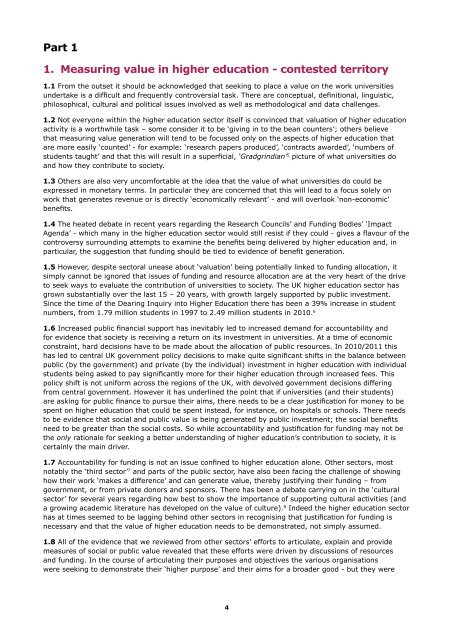Through a glass darkly Measuring the social value of universities
80096 NCCPE Social Value Report (2)
80096 NCCPE Social Value Report (2)
- No tags were found...
Create successful ePaper yourself
Turn your PDF publications into a flip-book with our unique Google optimized e-Paper software.
Part 11. <strong>Measuring</strong> <strong>value</strong> in higher education - contested territory1.1 From <strong>the</strong> outset it should be acknowledged that seeking to place a <strong>value</strong> on <strong>the</strong> work <strong>universities</strong>undertake is a difficult and frequently controversial task. There are conceptual, definitional, linguistic,philosophical, cultural and political issues involved as well as methodological and data challenges.1.2 Not everyone within <strong>the</strong> higher education sector itself is convinced that valuation <strong>of</strong> higher educationactivity is a worthwhile task – some consider it to be ‘giving in to <strong>the</strong> bean counters’; o<strong>the</strong>rs believethat measuring <strong>value</strong> generation will tend to be focussed only on <strong>the</strong> aspects <strong>of</strong> higher education thatare more easily ‘counted’ - for example: ‘research papers produced’, ‘contracts awarded’, ‘numbers <strong>of</strong>students taught’ and that this will result in a superficial, ‘Gradgrindian’ 5 picture <strong>of</strong> what <strong>universities</strong> doand how <strong>the</strong>y contribute to society.1.3 O<strong>the</strong>rs are also very uncomfortable at <strong>the</strong> idea that <strong>the</strong> <strong>value</strong> <strong>of</strong> what <strong>universities</strong> do could beexpressed in monetary terms. In particular <strong>the</strong>y are concerned that this will lead to a focus solely onwork that generates revenue or is directly ‘economically relevant’ - and will overlook ‘non-economic’benefits.1.4 The heated debate in recent years regarding <strong>the</strong> Research Councils’ and Funding Bodies’ ‘ImpactAgenda’ - which many in <strong>the</strong> higher education sector would still resist if <strong>the</strong>y could - gives a flavour <strong>of</strong> <strong>the</strong>controversy surrounding attempts to examine <strong>the</strong> benefits being delivered by higher education and, inparticular, <strong>the</strong> suggestion that funding should be tied to evidence <strong>of</strong> benefit generation.1.5 However, despite sectoral unease about ‘valuation’ being potentially linked to funding allocation, itsimply cannot be ignored that issues <strong>of</strong> funding and resource allocation are at <strong>the</strong> very heart <strong>of</strong> <strong>the</strong> driveto seek ways to evaluate <strong>the</strong> contribution <strong>of</strong> <strong>universities</strong> to society. The UK higher education sector hasgrown substantially over <strong>the</strong> last 15 – 20 years, with growth largely supported by public investment.Since <strong>the</strong> time <strong>of</strong> <strong>the</strong> Dearing Inquiry into Higher Education <strong>the</strong>re has been a 39% increase in studentnumbers, from 1.79 million students in 1997 to 2.49 million students in 2010. 61.6 Increased public financial support has inevitably led to increased demand for accountability andfor evidence that society is receiving a return on its investment in <strong>universities</strong>. At a time <strong>of</strong> economicconstraint, hard decisions have to be made about <strong>the</strong> allocation <strong>of</strong> public resources. In 2010/2011 thishas led to central UK government policy decisions to make quite significant shifts in <strong>the</strong> balance betweenpublic (by <strong>the</strong> government) and private (by <strong>the</strong> individual) investment in higher education with individualstudents being asked to pay significantly more for <strong>the</strong>ir higher education through increased fees. Thispolicy shift is not uniform across <strong>the</strong> regions <strong>of</strong> <strong>the</strong> UK, with devolved government decisions differingfrom central government. However it has underlined <strong>the</strong> point that if <strong>universities</strong> (and <strong>the</strong>ir students)are asking for public finance to pursue <strong>the</strong>ir aims, <strong>the</strong>re needs to be a clear justification for money to bespent on higher education that could be spent instead, for instance, on hospitals or schools. There needsto be evidence that <strong>social</strong> and public <strong>value</strong> is being generated by public investment; <strong>the</strong> <strong>social</strong> benefitsneed to be greater than <strong>the</strong> <strong>social</strong> costs. So while accountability and justification for funding may not be<strong>the</strong> only rationale for seeking a better understanding <strong>of</strong> higher education’s contribution to society, it iscertainly <strong>the</strong> main driver.1.7 Accountability for funding is not an issue confined to higher education alone. O<strong>the</strong>r sectors, mostnotably <strong>the</strong> ‘third sector’ 7 and parts <strong>of</strong> <strong>the</strong> public sector, have also been facing <strong>the</strong> challenge <strong>of</strong> showinghow <strong>the</strong>ir work ‘makes a difference’ and can generate <strong>value</strong>, <strong>the</strong>reby justifying <strong>the</strong>ir funding – fromgovernment, or from private donors and sponsors. There has been a debate carrying on in <strong>the</strong> ‘culturalsector’ for several years regarding how best to show <strong>the</strong> importance <strong>of</strong> supporting cultural activities (anda growing academic literature has developed on <strong>the</strong> <strong>value</strong> <strong>of</strong> culture). 8 Indeed <strong>the</strong> higher education sectorhas at times seemed to be lagging behind o<strong>the</strong>r sectors in recognising that justification for funding isnecessary and that <strong>the</strong> <strong>value</strong> <strong>of</strong> higher education needs to be demonstrated, not simply assumed.1.8 All <strong>of</strong> <strong>the</strong> evidence that we reviewed from o<strong>the</strong>r sectors’ efforts to articulate, explain and providemeasures <strong>of</strong> <strong>social</strong> or public <strong>value</strong> revealed that <strong>the</strong>se efforts were driven by discussions <strong>of</strong> resourcesand funding. In <strong>the</strong> course <strong>of</strong> articulating <strong>the</strong>ir purposes and objectives <strong>the</strong> various organisationswere seeking to demonstrate <strong>the</strong>ir ‘higher purpose’ and <strong>the</strong>ir aims for a broader good - but <strong>the</strong>y were4


